When you think of a German Shepherd, you might picture a sleek, powerful dog with a short coat. However, there’s a stunning variant that deserves attention: the Long Haired German Shepherd. With their flowing fur and captivating personalities, these dogs are not only beautiful but also make excellent companions. In this article, we’ll dive into their characteristics, care requirements, and why they might be the perfect addition to your family.
Understanding the Long-Haired German Shepherd
The Long Haired German Shepherd is a variation of the traditional German Shepherd, distinguished by its longer, flowing coat. While some people might think this breed is less common, it’s gaining popularity among dog enthusiasts for several reasons.
Characteristics
Long Haired German Shepherds have several distinctive features that set them apart from their short-haired counterparts:
- Coat: As the name suggests, their most prominent feature is their long, luscious coat. The fur is usually dense, straight, and may have a slight wave. Their undercoat provides insulation, making them suitable for various climates.
- Color: They come in various colors, including black and tan, sable, and solid black. Each coat color showcases their striking appearance.
- Temperament: Just like standard German Shepherds, Long-Haired German Shepherds are known for their intelligence, loyalty, and protective instincts. They are affectionate and form strong bonds with their families.
- Size: Adult Long-Haired German Shepherds typically weigh between 50 to 90 pounds and stand 22 to 26 inches tall at the shoulder.
Why Choose a Long Haired German Shepherd?
1. Unique Appearance
One of the most appealing aspects of Long Haired German Shepherds is their majestic look. With their flowing coats, they often resemble wolf-like creatures. This unique appearance can make them stand out in the park or at dog shows.
2. Great Companionship
Long-haired German Shepherds are known for their loyalty and companionship. They thrive on human interaction and are known to be protective of their families, making them excellent family pets.
3. Versatile Working Dogs
These dogs are not just pretty faces; they are highly trainable and intelligent. Long-haired German Shepherds excel in various roles, including service dogs, therapy dogs, and even police work. Their eagerness to learn makes them suitable for various activities, from agility training to obedience competitions.
Anecdote: A friend of mine has a Long Haired German Shepherd named Max, who participates in agility competitions. His impressive speed and agility combined with his gorgeous coat make him a crowd favorite!
Care Requirements for Long-Haired German Shepherds
While Long-Haired German Shepherds are stunning and make wonderful pets, they do require specific care to keep them healthy and happy.
1. Grooming
Due to their long fur, regular grooming is essential. Here are some grooming tips:
- Brushing: Brush your dog at least two to three times a week to prevent matting and reduce shedding. A slicker brush or a de-shedding tool works well for this breed.
- Bathing: Bathe your Haired German Shepherd every two to three months, or as needed, to keep their coat clean and fresh. Use a gentle dog shampoo to avoid irritating their skin.
- Ear Care: Check their ears regularly for dirt or wax buildup. Cleaning them with a vet-recommended solution can help prevent infections.
2. Exercise
Long-haired German Shepherds are active dogs that need plenty of exercise. Aim for at least 1 to 2 hours of physical activity each day. This can include walks, runs, playtime, or even trips to the dog park. Mental stimulation is equally important, so consider puzzle toys or training exercises to keep their minds engaged.
3. Diet
A balanced diet is crucial for your dog’s overall health. Look for high-quality dog food that lists meat as the first ingredient. Consult your veterinarian for specific dietary recommendations based on your dog’s age, weight, and activity level.
4. Health Care
Regular vet check-ups are essential for maintaining your dog’s health. Long Haired German Shepherd can be prone to certain health issues, such as hip dysplasia and degenerative myelopathy. Early detection and preventive care can help ensure a long, healthy life.
Training Your Long-Haired German Shepherd
Training is a vital aspect of raising a well-behaved Long Haired German Shepherd. Here are some tips to get started:
1. Start Early
Begin training as soon as you bring your puppy home. Socialization and basic obedience training are crucial during the first few months. Expose your puppy to various people, animals, and environments to help them become well-adjusted adults.
2. Use Positive Reinforcement
Long Haired German Shepherds respond best to positive reinforcement techniques. Reward your dog with treats, praise, and playtime for good behavior. This approach encourages them to learn and follow commands willingly.
3. Be Consistent
Consistency is key when training your dog. Use the same commands and signals for each action to help your puppy learn faster. Set clear boundaries and stick to them to avoid confusion.
4. Seek Professional Help
If you’re struggling with training, don’t hesitate to seek help from a professional dog trainer. They can provide valuable insights and techniques tailored to your dog’s needs.
Conclusion: A Perfect Companion
In summary, the Long Haired German Shepherd is a stunning breed that combines beauty, intelligence, and loyalty. With proper care, training, and socialization, these dogs can make excellent companions and family pets. Whether you’re looking for a working dog, a family member, or a faithful friend, this breed is sure to capture your heart.
If you’re considering adding a Long Haired German Shepherd to your family, do your research and connect with reputable breeders or adoption centers. This way, you can ensure that you’re welcoming a healthy, well-bred dog into your home.
Hyperlinks:
Denise Frazier Dog: Heartwarming Ownership Guide
How rare are long hair German Shepherds?
Long Haired German Shepherds are relatively rare compared to their short-haired counterparts. While the traditional German Shepherd breed standard prefers a short, dense coat, the long-haired variant occurs due to a recessive gene. This means that breeders need to specifically select for this trait, making it less common. Additionally, many breeders focus on producing the more popular short-haired German Shepherds, leading to fewer long-haired puppies available. Despite their rarity, Long Haired German Shepherds are gaining popularity among dog lovers for their unique appearance and gentle temperament, contributing to an increasing interest in this stunning variation.
What is the difference between a German Shepherd and a long haired German Shepherd?
The primary difference between a German Shepherd and a Long Haired German Shepherd is their coat length. While standard German Shepherds have short, dense fur, Long Haired German Shepherds feature a longer, flowing coat that is often wavy or straight. This variation in coat can affect grooming needs; Long Haired German Shepherds require more frequent brushing to prevent matting. Both types share similar traits, including intelligence, loyalty, and versatility, making them excellent companions and working dogs. Additionally, the long-haired variety may be less common but is equally capable in various roles, from family pets to service dogs.
Are long-haired German Shepherds more docile?
Long-haired German Shepherds are not inherently more docile than their short-haired counterparts. Their temperament largely depends on individual personality, training, and socialization. Both long-haired and short-haired German Shepherds can exhibit a range of behaviors, from calm and friendly to energetic and protective. However, many owners find that long-haired German Shepherds tend to be affectionate and good-natured due to their nurturing nature. Consistent training and early socialization play crucial roles in shaping any dog's behavior. Ultimately, a dog's docility is more influenced by its upbringing than by the length of its coat.
What is the rarest German Shepherd color?
The rarest German Shepherd color is the pure white coat. While most German Shepherds are known for their black and tan coloration, the white variant is less common and often misunderstood. This striking color is due to a recessive gene, making these dogs more difficult to breed. Although they share the same temperament and characteristics as standard German Shepherds, pure white German Shepherds are often not recognized in dog shows and competitions due to breed standards. Other rare colors include blue and liver, but the pure white German Shepherd stands out as the most elusive in the breed.

